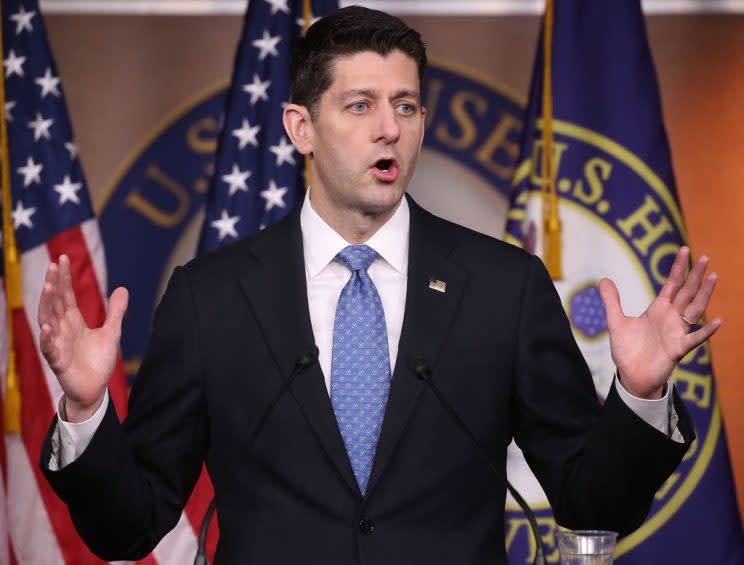Women Are Reportedly Banned From Going Sleeveless in Congress. Is Paul Ryan to Blame?

All across America, women’s rights activists are turning up at protests over the proposed healthcare bill, wearing white bonnets and red robes, their heads bowed low. Their outfits are chosen in accordance with what the handmaids are forced to wear in Margaret Atwood’s 1985 novel, The Handmaid’s Tale, now a Hulu series, which imagines a dystopian American future in which women have lost all rights. The point being made via the demonstrators’ wardrobe is, obviously, that it’s where we’re heading, with women’s rights being slowly chipped away.
That Handmaid’s Tale symbolism was evoked once again on Thursday, this time in reference to a series of reports coming out of Washington about women being barred from entering the Speaker’s Lobby, a room adjacent to the House chamber. Why? For wearing sleeveless dresses and blouses that expose their shoulders, as well as open-toed shoes.
The official written rule for dress code in Congress is that people should wear “proper attire as determined by the Speaker.” For men that means “coats and ties,” and for women that means, well, “proper attire as determined by the Speaker.” And that would be, at this point, Paul Ryan. But many women who have been reporting on Capitol Hill for years have come forward to tamp down the fresh outrage, noting that the no-sleeveless rule is nothing new, and is in fact well understood by the journalism vets in town for years (under a series of different speakers, including Nancy Pelosi).
CBS News first reported the latest sleeveless story, though, detailing the account of a female reporter who was not permitted to enter the area due to her exposed shoulders. “Forced to improvise, she ripped out pages from her notebook and stuffed them into her dress’s shoulder openings to create sleeves, witnesses said. An officer who’s tasked with enforcing rules in the Speaker’s Lobby said her creative concoction still was not acceptable.”
This is real. Fellow female reporters barred from Speaker’s lobby for wearing sleeveless dresses while doing their jobs. (It’s hot in DC) https://t.co/8evY6wQmA8
— K Tully McManus (@ktullymcmanus) July 6, 2017
Can confirm I was warned the next time I would be removed https://t.co/M0BTcFYchO
— Kellie Mejdrich (@kelmej) July 6, 2017
Jezebel quickly followed the CBS story with a similar report, this time with a headline that read, “The House Has a New ‘No Sleeveless’ Dress Code for Women” — although it was swiftly changed to “The House Has a ‘No Sleeveless’ Dress Code for Women,” as the claim that the policy was “new” turned out to be inaccurate.
New or old, The Handmaid’s Tale parallels quickly began: “The U.S. House of Reps has a new ‘no sleeveless, no open toe shoes’ dress code cuz going straight to red robes & white bonnets was too drastic,” one woman tweeted. “Blessed be the fruit,” tweeted another, calling out the religious refrain people are forced to recite in the world of the novel.
The complexity here is that, again, this rule is not new, and the debate about what to wear in D.C. seems to rage annually when the city begins to feel like the swamp that it is; former Speaker John Boehner often reminded members of the dress code. After Thursday’s report from CBS, many women came forward to share experiences they have faced of being told to cover up while at the House, some of which occurred years ago.
That has been the rule forever. It’s not Paul Ryan.’s rule–every reporter knows that that works on the hill for any length of time. https://t.co/3aOlvMl4Zw
— SalenaZito (@SalenaZito) July 7, 2017
1. this rule is 100 percent not new. 2. ive seen congressmen be forced to put jackets on before going to the floor. https://t.co/QiYTLMVzJF
— Kate Nocera (@KateNocera) July 6, 2017
The Speaker’s Lobby has one of the most ridiculous and backwards dress codes around. Did when I covered Congress. Still does. https://t.co/88yv6YSuz1
— Lizzie O’Leary (@lizzieohreally) July 6, 2017
Wore a sleeveless, work-appropriate dress to Speaker’s Lobby six years ago and was advised to “please cover up” next time. https://t.co/66biNrmbtQ
— Patricia Mazzei (@PatriciaMazzei) July 6, 2017
The vagary, of course, is in the wording — “appropriate attire” — and the fact that while, for men, that is explicitly defined as coats and ties, the interpretation of “appropriate” for women is left up to the speaker. Just a few weeks ago, Speaker Ryan reminded those in the House that “members should wear appropriate business attire.” Still, with no definition of what that means.
.@SpeakerRyan: “Members should wear appropriate business attire…” pic.twitter.com/a4f1Oy5ifT
— CSPAN (@cspan) June 23, 2017
What likely makes the policing of toes and shoulders so striking this time around is that it seems to be in keeping with a Republican trend. At the 2016 Republican National Convention, female reporters were told by volunteers that their shoulders needed to be covered at RNC events. Similarly, President Trump famously prefers that the women he works with “dress like women,” which apparently means in dresses.
While what many are calling #Sleevegate seems to come up annually, the lack of definition for “appropriate attire” becomes inherently sexist when it becomes about policing body parts. And when the definition is determined by the speakers themselves, it’s virtually impossible to be anything but a reflection of their politics.
Read more from Yahoo Style + Beauty:
Follow us on Instagram, Facebook, and Pinterest for nonstop inspiration delivered fresh to your feed, every day. For Twitter updates, follow @YahooStyle and@YahooBeauty.



